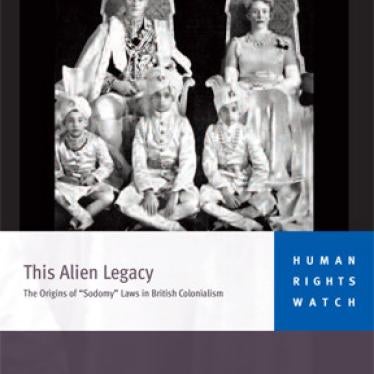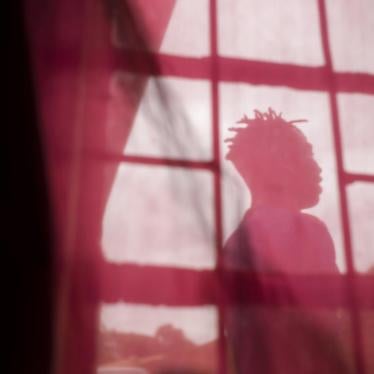Human Rights Watch protects lesbian, gay, bisexual, and transgender people who are subject to discrimination and violence—and sometimes even torture or execution—because of their sexual orientation or gender identity. We advocate for the principles outlined in the Yogyakarta Principles, the groundbreaking document adopted in Yogyakarta, Indonesia, that lays out governments’ duties to protect LGBT people’s rights. In recent months, our efforts have led to positive impact in several countries.
In Malawi, Human Rights Watch helped secure a pardon for a same-sex couple sentenced to 14 years with hard labor for celebrating a traditional engagement ceremony. By working with LGBT rights groups in Albania and Lithuania, we successfully pressed the parliaments of both countries to uphold the rights of LGBT people. In Uganda, our joint advocacy with LGBT rights groups has stalled the passage of Uganda’s controversial “anti-homosexuality bill”—and our advocacy on this particularly repressive legislation continues to this day.
Malawi
In May, Human Rights Watch helped secure a pardon for a Malawian same-sex couple sentenced to 14 years with hard labor for celebrating a traditional engagement ceremony. By working together with local groups and international actors, we helped persuade Malawi’s president to grant their release.
When Human Rights Watch learned of the arrest, we immediately made contact with local lawyers and rights groups to ascertain the situation on the ground. We sent President Mutharika an open letter outlining our position on the couple’s case. At the same time, Dipika Nath, a researcher with our LGBT Rights Program, reached out to Malawian officials responsible for public security and to the Malawi Human Rights Commission, urging them to work for the couple’s release. We contacted European diplomats based in Malawi to provide them with information on the case and to enlist their support.
Tiwonge Chimbalanga, aged 20, who self-identifies as a woman, and Steven Monjeza, aged 26, were charged in December with “unnatural offences” and “indecent practices between males.” Malawi’s law criminalizing consensual homosexual conduct is a legacy of the country’s colonial past. As Human Rights Watch has documented, British colonial rulers imposed laws regulating sexual and social conduct in dozens of countries in Africa, Asia, and the Pacific. These laws are now often defended by Asian and African governments erroneously as products of native culture and tradition. A court denied the couple’s request for bail, and authorities subjected them to medical examinations without their consent to look for “evidence” of sexual relations with males. Forensic medical examinations to “prove” homosexual conduct are archaic and discredited and, when conducted without consent in conditions of detention, may constitute torture.
Ultimately, Human Rights Watch reached out to UN Secretary-General Ban Ki-moon within a few days of his visit to Malawi, asking him to call for the couple’s release. It was the next day, during his meeting with Ban, that President Mutharika issued the pardon.
Albania
In February, at Human Rights Watch’s urging, the Albanian parliament adopted an anti-discrimination law to protect LGBT people from violence and unfairness. The law is not only a major breakthrough for Albania in itself; it also sets a powerful precedent for neighboring countries. Human Rights Watch is monitoring the new law’s implementation in the context of Albania’s ongoing bid to join the European Union. For over a year, Human Rights Watch worked with Albanian human rights groups to support changes in Albanian law that would offer anti-discrimination protections in keeping with the standards articulated by the Yogyakarta Principles. Albanian groups had reached out to us about high levels of homophobia in Albanian society and a dire lack of legal protection, sharing with us incidences of harassment, discrimination in the work place, and physical violence. We organized a roundtable discussion in Tirana with 10 Albanian human rights organizations to discuss the issue. The groups concluded that a broad anti-discrimination law that would expressly protect LGBT Albanians against unequal treatment should be a top priority for government action.
The same week, Boris Dittrich, advocacy director of Human Rights Watch’s LGBT Rights Program, met with Albanian Prime Minister Sali Berisha, other government ministers, and members of parliament to discuss the LGBT community’s plight. Dittrich made the case that, by bringing Albania’s discrimination laws in line with EU and international law, Albania would actually help its bid to join the European Union.
Prime Minister Berisha responded by inviting local civil society groups to discuss anti-discrimination legislation. Albanian human rights organizations prepared a first draft of the bill and negotiated its contents with the government. The new law passed in February with the prime minister’s full backing.
Lithuania
Human Rights Watch helped prevent the passage of homophobic amendments to a child protection law in Lithuania. One of the proposed amendments would have banned information encouraging “homosexual and bisexual relations” from being distributed in schools or other public places.
Our advocacy centered on how these amendments could be used to deprive young people of information they need to make decisions about their lives and their health. We also explained how some of the bill’s provisions could be used to deny LGBT groups or individuals freedom of expression.
Members of local LGBT groups contacted Human Rights Watch asking for support. We responded by meeting with key members of the Lithuanian LGBT community to strategize. LGBT Rights Advocacy Director Boris Dittrich then met with several parliamentary committees as well as conservative members of parliament who supported the amendments.
As a result of this outreach, the Lithuanian president vetoed the law.
The fight didn’t end there, however. Months later, the parliament renewed discussions on the legislation. We met with key lawmakers to reiterate our stance on the harmful amendments. Parliament ultimately rejected the most discriminatory amendments.
Uganda
Months of advocacy conducted by Human Rights Watch staff has helped stall the passage of Uganda’s controversial “anti-homosexuality bill.” The bill under consideration would introduce severe criminal penalties including the death penalty in certain cases and would make supporting LGBT rights a crime. Maria Burnett, senior researcher on Uganda, has been working closely with Ugandan civil society to defeat the bill and to undo the effects of state-sponsored homophobia.
Because momentum for this bill is fueled in part by a conservative interpretation of Christianity, we and other nongovernmental organizations urged members of the Obama administration to speak out during the National Prayer Breakfast earlier this year. During the breakfast, President Obama described the proposed legislation as “odious” and Secretary of State Clinton said she had telephoned Ugandan President Museveni and expressed her strongest concerns about the bill.
Human Rights Watch continues to work closely with Ugandan civil society, supporting its advocacy with the government, diplomats, and the media, and backing its struggle to permanently shelve the bill and repeal the current colonial-era criminal provisions regarding homosexuality.







